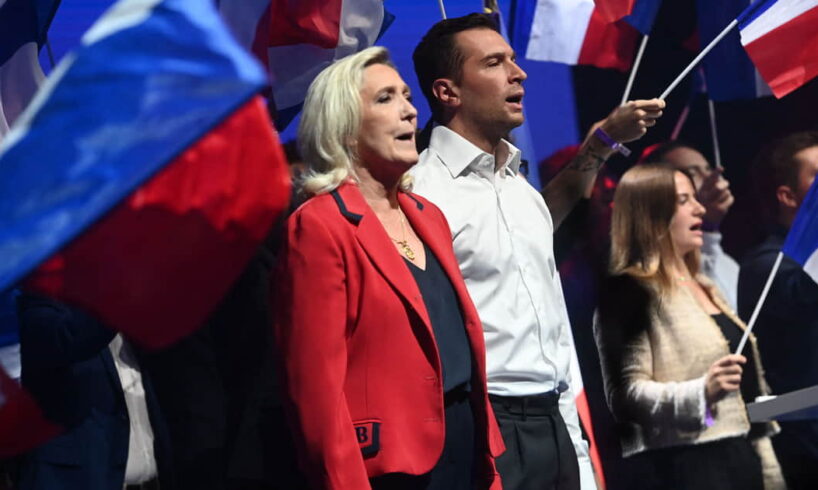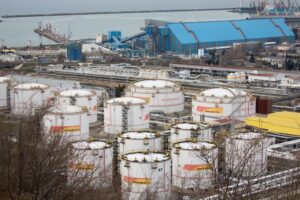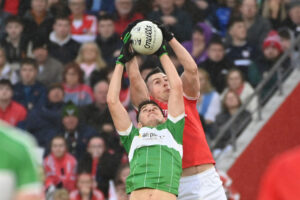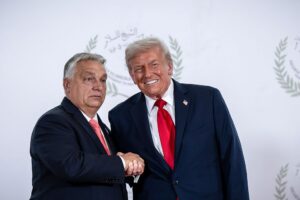
In the event of early elections in France, Marine Le Pen’s party National Rally has every chance of winning a majority and, for the first time in history, forming its own government.
Such a prospect is a real shock both for Ukraine and for many French people.
Created in 1972 by Jean-Marie Le Pen, the Front National (now Rassemblement National) emerged from the ashes of far-right Catholic traditionalism, anti-communist networks, and a deep-rooted nostalgia for French colonial grandeur.
With a blend of ultra-nationalist identity politics, virulent Euroscepticism, and opposition to globalisation, the party remained politically marginal for decades, dismissed as a relic of extremist French nationalism, and as the legacy of Petain’s backstabbing during World War II. But as economic turmoil grew and mainstream politics fractured, its message had to evolve.
By the 1990s and 2000s, immigration fears, anti-elite sentiment, and suspicion of supranational institutions began to resonate. What started as a fringe reactionary movement found new energy in opposing “Anglo-American imperialism,” NATO, and a perceived Western moral decline, all ideas that, over time, aligned with Russian strategic narratives.
France’s legacy of Gaullist “grandeur,” strategic autonomy, and mistrust of alignment sowed fertile ground for this drift, one that, decades later, would see the far-right party not only ideologically but financially entwined with the Kremlin.
From anti-Soviet to anti-American
In its early years, the Front National was vocally anti-communist. During the Cold War, Jean-Marie Le Pen’s movement positioned itself as a patriotic rampart against the Soviet threat. The USSR, in its eyes, was the embodiment of moral decay, tyranny, and global ideology control, everything the FN sought to combat in the name of national sovereignty.
But with the collapse of the Soviet Union in 1991, the party’s external enemy shifted. The fall of the Berlin Wall marked not a triumph for democracy in FN discourse, but the rise of a new hegemon: the United States. As American influence spread across Europe through NATO and global liberal economic model, the FN’s narrative pivoted.
Washington replaced Moscow as the central force undermining French sovereignty and identity.
The 1999 NATO intervention in Kosovo was a watershed moment. While most of the French political elites supported the operation as a humanitarian necessity, Le Pen’s FN denounced it as “a colonial war under American command.” The bombing of Belgrade, a historical ally of France, was framed as an imperial overreach and a betrayal of European independence.
For the FN, Serbia became a symbol of resistance to American unipolarity, and the possibility of future alignment with Moscow were ignited. Russia, opposing NATO’s intervention, became an implicit ally in the fight against Atlanticist “interference.”
In the early 2000s, Jean-Marie Le Pen began expressing admiration for “strong” national leaders who rejected Western liberal models: Bashar al-Assad, Saddam Hussein, and increasingly, Vladimir Putin. These figures were praised not for their democratic credentials, but for their ability to resist “globalist domination” and maintain traditional, patriarchal values.
Putin, in particular, stood out. For the FN, the Russian-elected president embodied a “civilisational” response to the perceived decadence of the West, tough on crime, uncompromising on sovereignty, and hostile to “Americanisation.”
In 2006, Le Pen defended the Russian war in Chechnya, justifying Moscow’s heavy-handed tactics as necessary to fight terrorism. At the same time, he began referring to Ukraine as a “buffer state” manipulated by the West, accusing the EU of “provoking” Russia through expansion and liberal proselytising.
This reorientation wasn’t unique to France. Similar ideological shifts were observed among far-right parties in Europe: Austria’s FPÖ, Hungary’s Fidesz, and Italy’s Lega Nord all adopted increasingly pro-Russian rhetoric, especially after 9/11 and the 2008 financial crisis.
What united them was a shared resentment of American hegemony, a suspicion of EU institutions, and a search for alternative models of sovereignty. From anti-Soviet to anti-American, from NATO scepticism to open admiration for authoritarian resilience, the FN’s ideological compass turned east.
Ukraine, in this narrative, was collateral damage. Its aspirations for EU and NATO membership were dismissed as artificial, Western-imposed, and ultimately dangerous, not just for Russia, but for Europe’s balance of power. Long before the 2014 annexation of Crimea, the FN was already defending Russia’s regional interests in the name of multipolarity.
The Moscow loan that changed everything
French analysts and Ukraine’s diplomatic circles began sounding the alarm. In 2014, the think-tank Fondation pour l’Innovation Politique published a detailed report highlighting the FN’s growing ideological alignment with Moscow.
Ukrainian diplomats in Paris quietly expressed concern to the French Foreign Ministry: could one of the largest opposition parties of France, a permanent member of the UN Security Council, become a supporter of Russian influence?
The concern wasn’t unfounded. Just six months after the annexation of Crimea, while much of Europe was bracing for a long-term confrontation with Moscow, the Front National secured a €9.4 million loan from the First Czech-Russian Bank, a Moscow-based institution led Roman Popov, a former Russian state banker with connections to the Kremlin and known for its role in facilitating shadow finance.
Wallerand de Saint-Just, FN’s treasurer, reportedly made a short trip to Moscow to finalise the deal, an arrangement he later described as “simple and friendly.” The contract stipulated a 6% annual interest rate, and a repayment deadline set for 2019. What it didn’t explain was why this Russian bank, already under scrutiny in Western intelligence circles, was willing to finance a European party shunned by all major French lenders.
This was no ordinary financial transaction. No matter the denials of political influence, the signal to Paris, Brussels, and Kyiv was impossible to ignore.
The Front National had been struggling to secure campaign funding for years.
French regulations limit foreign donations but not foreign loans, creating a grey zone that the party could exploit. But domestic banks wouldn’t touch the FN, not only due to its extremist stance, but also the reputational risk of being tied to a party under recurrent financial scrutiny and judicial investigation.
Several large institutions, including Société Générale and Crédit Agricole, reportedly declined FN requests.
So, the party looked east. And found Moscow ready to oblige.
The timing was no accident. The deal came just six months after Russia annexed Crimea. While most of the EU was drafting sanctions, Marine Le Pen publicly defended the annexation as legitimate, claiming the Crimean referendum reflected the “will of the people,” and blasted Brussels for launching an “ideological Cold War.”
The bank that issued the loan, FCRB, was known in the financial community for its murky structure and past entanglements with Russian state-linked projects.
It had no prior history of political lending in Europe. And yet, it offered the FN a loan with favourable terms and no apparent conditionalities.
But transparency was elusive. In 2016, FCRB collapsed under unclear circumstances. The debt was then sold, reportedly without the FN’s consent, to Aviazapchast, a Russian company specialising in aviation parts with military clients, formally sanctioned by the United States in 2022 under OFAC rules.
The loan, originally billed as a “commercial transaction,” had now landed in the dirty hands of a firm with ties to the Russian defence sector.
As of 2025, the debt remains active and not fully repaid.
The party, through a 2016 agreement, was scheduled to repay the full loan amount by 2028, in quarterly instalments. Marine Le Pen insists it’s being reimbursed “normally”, though delays have been reported, and key details remain sealed.
French investigative journalists from Mediapart and France Info have pointed to shell companies, payment restructurings, and opaque arbitration processes involving Dubai and Moscow.
France was not alone in this phenomenon. Russia’s political courtship extended across the continent. In Italy, the Lega Nord signed a cooperation agreement with Putin’s United Russia in 2017, while in Germany, the AfD benefited from disproportionate RT coverage and saw several of its politicians travel to Crimea after the annexation.
But what makes the French case exceptional is the size and strategic importance of France within the EU and UN, putting the whole Union at risk.
Complete understanding with Putin
If the 2014 loan cemented a financial alliance, the 2017 presidential campaign revealed the soft power dividends Russia expected in return. With the war in Ukraine relegated to the background of French public opinion, the Kremlin doubled down on its information strategy, and Marine Le Pen emerged as a favoured figure.
In the months leading up to the April 2017 election, Russian state-backed media gave Marine Le Pen disproportionate airtime. According to a 2017 report by the French media watchdog CSA, RT France and Sputnik gave Le Pen over 4x more favourable coverage than Emmanuel Macron or François Fillon.
The narrative was consistent: Le Pen stood for sovereignty, anti-Americanism, and a break with Brussels.
Then came the visit. Just two weeks before the first presidential round, Marine Le Pen flew to Moscow and met with president-elected Vladimir Putin at the Kremlin. The handshake, carefully choreographed, made international headlines. Putin declared that he “did not want to interfere in the French election”, only to praise Le Pen’s “representation of a European political movement that is rapidly growing.”
French intelligence services, including the DGSE, were already warning of Moscow’s election interferences. Macron’s campaign team accused Russian hackers of targeting internal servers, allegations later echoed by the CIA and British GCHQ.
While direct ties between the RN and cyber operations were never proven, the convergence of financing, media support, and political narratives raised eyebrows in Brussels and Kyiv alike.
At this time, Le Pen’s discourse on Ukraine remained tightly aligned with Russian interests. Crimea was still described as “not illegitimate,” sanctions as “unjust,” and Ukraine’s political class as “puppets of Washington and Brussels.” While her campaign rhetoric softened, part of her so-called dédiabolisation strategy, her foreign policy ambitions remained unambiguously Russia-friendly.
What had begun as ideological alignment in the early 2000s was now being operationalised through visits, votes, and media campaigns. And while Le Pen lost the election, the obscure connection between the RN and Moscow had outlived the campaigns themselves.
The shock of war and narrative correction
As Europe climatre shifted progressively toward war, Rassemblement National (RN) remained ideologically anchored: sceptical of NATO, wary of sanctions, and deferential to Moscow. Just weeks before Russia’s full-scale invasion of Ukraine, Marine Le Pen was still insisting that “NATO should be dismantled” and that sanctions were “ineffective” and “hurting French interests more than Russia’s.”
This stance was not new. In 2020 and 2021, RN deputies regularly abstained from key resolutions condemning Russian repression, including motions on the poisoning of Alexei Navalny and crackdowns on civil society.
In the European Parliament, RN members continued voting in line with Russia-friendly factions such as Hungary’s Fidesz and Germany’s AfD, forming a voting bloc that repeatedly resisted strong-worded texts against the Kremlin.
But the invasion on 24 February 2022 forced a partial recalibration.
Suddenly, the images of tanks rolling into Kyiv left little space for ambiguity. Public opinion in France swung hard in support of Ukraine: over 85% of French citizens condemned Russia’s aggression, according to an IFOP poll. The RN was caught off guard.
Le Pen’s response was cautious, and calculated. A week after the invasion began, her campaign team quietly removed a leaflet that featured a smiling photo of her shaking hands with Vladimir Putin during her 2017 Kremlin visit. In public, she condemned the invasion, while carefully making sure to avoid naming Putin as the aggressor. Instead, she blamed NATO “provocations” and maintained that France should remain neutral and act as a “mediator.”
This ambiguity extended to parliamentary votes. On 1 March 2022, when the French National Assembly voted overwhelmingly (303 in favour, 1 against, 95 abstentions) for a resolution affirming France’s support for Ukraine, all RN deputies abstained. A month later, the party opposed sanctions targeting Russian gas imports, citing risks to the French economy.
Meanwhile, the party’s leadership tried to deflect scrutiny over its historical proximity to Moscow. When asked about the €9.4 million Russian loan, Le Pen insisted the party was the victim of a “witch hunt” and claimed repayment had been ongoing since 2015 – a statement later contradicted by French investigative outlets like Mediapart and France Info, which revealed continued payment delays and ties to sanctioned Russian entities.
Ukrainian officials were watching closely. In March 2022, Ukraine’s Ambassador to France, Vadym Omelchenko, warned that “a party with financial obligations to Russian banks cannot claim to defend European sovereignty.”
Jordan Bardella, Le Pen’s rising successor, began softening the party’s most controversial statements,
speaking of “Ukrainian bravery” and backing humanitarian aid, but avoided any firm stance on sanctions or military support. The line was clear: oppose escalation and prioritise French interests.
Still, traces of RN’s old stance remained: in internal speeches and interviews, senior figures like Thierry Mariani and Andréa Kotarac continued amplifying narratives of NATO expansionism and “Ukrainian provocation,” often citing Russian media sources.
Strategic ambiguity
After the shock of 2022, RN leaders began echoing softer language. Marine Le Pen declared in late 2023 that Ukraine “must be defended,” but quickly qualified her statement: “But France must not be dragged into a war that is not ours.” Jordan Bardella, now party president and head of the 2024 European elections campaign, struck a similar tone. In a interview in Eurosatory arms fair, he stated:
“I wish for Ukraine to have at disposal the ammunition and equipment it needs to hold the front, but my red line will not change, which is sending equipment that could have consequences of escalation in eastern Europe,” Bardella told reporters at the Eurosatory arms fair near Paris.
“And so I don’t plan to send,especially, long-range missiles or other weapons that will allow Ukraine to strike the Russian territory. My position has not changed and will not change – it’s about support for Ukraine and avoiding all risks of escalation in the region. And I think the risk of escalation is of course real.”
This position resonated with parts of the French public growing tired of war.
A 2024 IFOP poll showed that while 70% of French citizens supported Ukraine in principle, only 39% backed the idea of sending arms indefinitely. Bardella’s narrative aligned RN with “peace” and “realism”, while distancing the party from what it portrayed as Macron’s “escalatory” policy.
In early 2024, RN abstained en bloc from a pivotal vote ratifying the Franco-Ukrainian bilateral security agreement, signed between Presidents Zelenskyy and Macron. The deal formalised long-term French commitments to military training, arms deliveries, and reconstruction assistance.
Then, in March 2025, RN deputies again abstained on a resolution proposing that frozen Russian assets in French and European banks be redirected toward Ukraine’s reconstruction. While supported by a large cross-party majority, RN claimed the measure would violate “financial sovereignty” and provoke Russian retaliation.
Many of the figures shaping RN’s foreign policy remained consistent: Thierry Mariani, still an MEP, continued appearing on Russian state media and attending forums such as the “Dialogue of Civilizations” in Moscow. Former party treasurer Wallerand de Saint-Just, who negotiated the 2014 Russian loan, remained a vocal critic of sanctions.
Bardella, though more media-moderate, never publicly disavowed the party’s Russian loan, nor did he fully break with Le Pen’s geopolitical positions. Instead, he offered a repackaged version of the same line: protect Ukraine, but only within strict national interests; resist Russia, but not at the cost of French energy bills or diplomatic leverage.
Meanwhile, the RN base remained disproportionately sympathetic to Russia. A 2024 Fondation Jean-Jaurès study found that RN voters were three times more likely than average to blame NATO for the war, and nearly half agreed with the statement: “Putin defends traditional values against Western decadence.”
In a confidential briefing published by Le Monde, French diplomats reportedly warned that “a Bardella government would freeze bilateral military aid within weeks.”
Ukrainian experts speaking to European Pravda noted the parallel with Slovakia’s recent reversal under Robert Fico, a pro-European campaign, followed by an abrupt shift once elected.
****
More than a decade has passed since the Rassemblement National, then still the Front National, signe a €9.4 million loan with the now-defunct First Czech-Russian Bank (FCRB). But in 2025, the financial, and political, consequences of that decision continue to ripple, despite Marine Le Pen’s repeated efforts to dismiss the issue as “archived.” In an interview with BFMTV in late 2024, Le Pen said:
“We have nothing to do with Russia anymore. That loan was a closed chapter.”
But follow-up investigations proved otherwise. Le Monde revealed that RN has not repaid the loan early nor refinanced it through French institutions, despite now having the financial capacity to do so, after strong EU electoral results and increased state subsidies.
That unwillingness to close the financial loop has only amplified suspicion.
RN insists there’s no political influence at play. France’s own intelligence services disagree.
According to a classified DGSI (General Directorate for Internal Security) note leaked to Mediapart, French intelligence has continued monitoring the party’s ties to Russian-linked entities since 2017. The 2023 report, partially quoted in Parliament, stated:
“The unresolved nature of the debt to a sanctioned Russian firm constitutes a potential vector of foreign influence.”
The issue has become so sensitive that President Macron, in a January 2025 National Assembly session, accused Le Pen of maintaining “a financial umbilical cord with the Kremlin.” She walked out of the chamber.
France is not just any country. It is a nuclear power, a UN Security Council member, and a pillar of EU strategy. A Bardella-led government could undercut Ukraine aid, block EU sanctions, and fracture European resolve, all while claiming neutrality.
For Ukraine, it risks the erosion of one of Europe’s strongest allies.
Charlotte Guillou-Clerc,
Journalist (France), European Pravda trainee
If you notice an error, select the required text and press Ctrl + Enter to report it to the editors.





